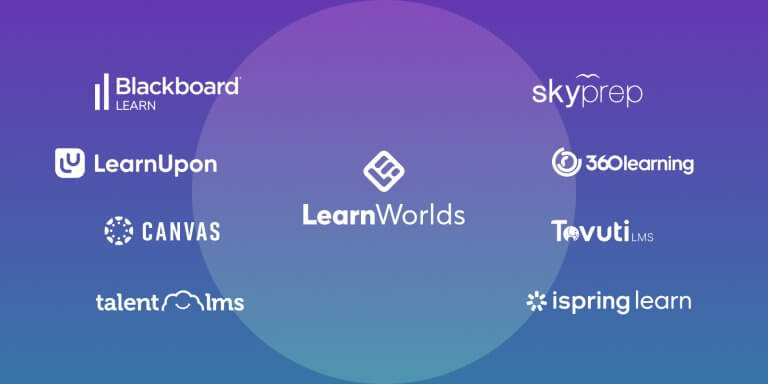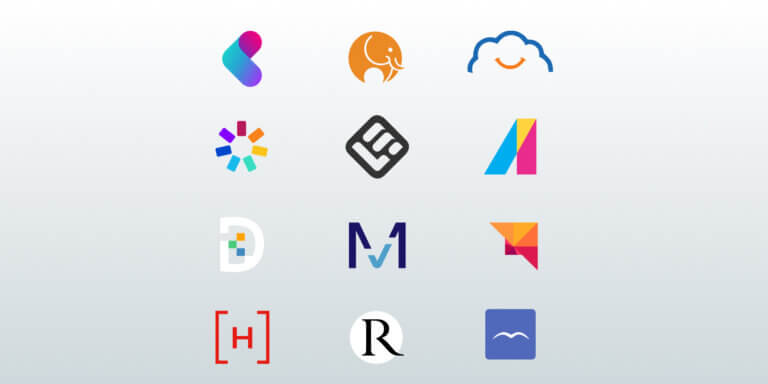Table of Contents
As a small business owner, you have a lot on your mind. Employee training might not be on your high-priority list because you lack the human resources or budget. But did you know that skills training is closely linked to employee retention? From your new hires to seasoned members of your workforce, modern employees feel strongly about their career development.
So much so, that 41% of employees will look for another job in 2024 if their company doesn’t provide them with training opportunities.
What you need to offer training is not a hefty budget or a large team of experts – you just need the right technology. Shifting from on-site to elearning courses can get a lot off your plate. Using a Learning Management System can help you offer a centralized learning hub where employees can both find self-paced training material and join live sessions.
Not only that – an LMS can help you cut down on development costs because you only have to build your learning programs once and then update them occasionally to keep them relevant. There’s no need to start over every time a new employee joins, or a minor change occurs.
9 Features of an LMS for Small Business
Is an LMS for small business supposed to have fewer features? Not at all! Instead, a small business LMS needs to have the right features:
Best Learning Management Systems for Small Businesses
These are the best Learning Management Systems for your small business. They’re all cloud-based and come with rich functionalities that make them suitable for all types of online training programs, from new employee onboarding to compliance training and customer education.
1. LearnWorlds – Our Top Choice 🔥
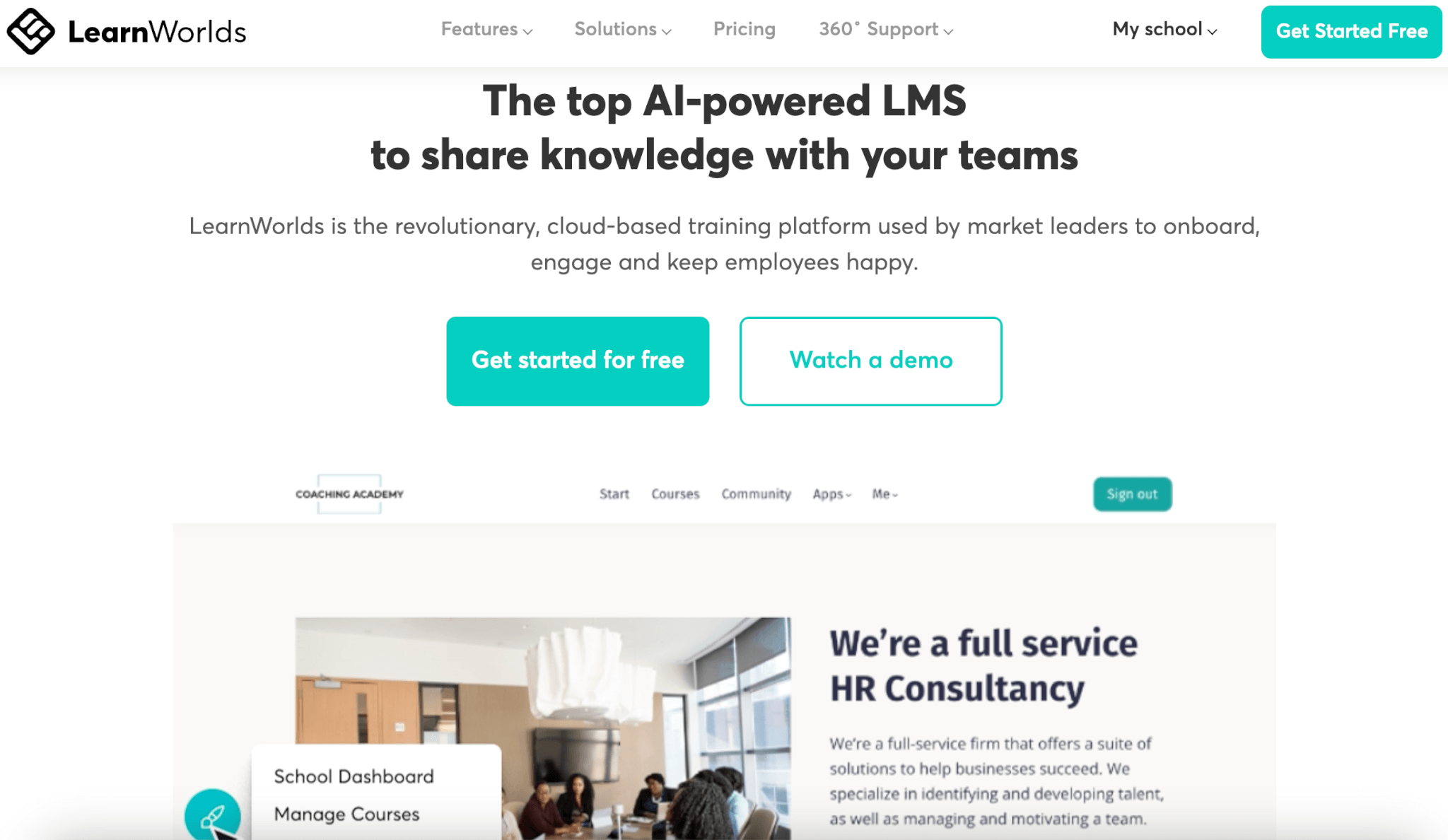





LearnWorlds is one of the most high-ranked LMS providers. Our platform offers a smooth user experience in a modern learning environment. It enables you to build your training courses fast and is suitable for all your training needs, internal and external.
Key features include multimodal learning and personalized learning paths, mobile learning via branded mobile apps, and built-in authoring tools to add interactivity to your eBooks and videos. We also have an advanced AI assistant featuring pre-built prompts, with the ability to create or repurpose content.
Our assessment builder is also impressive, supporting more than 17+ question types and offering advanced settings like limits, number of attempts allowed, individual scoring, automated feedback, and more. As for analytics, they go into as much detail as it gets. You’ll get insights into learner behavior with content, the performance and popularity of your courses, and, if you’re selling, sales reports. And if you want to get feedback directly from your employees, use our built-in survey builder.
Another key differentiator of LearnWorlds is that it’s eCommerce-ready, with numerous built-in integrations with payment gateways, email marketing tools, CRM, and more.
Highly scalable and automated, LearnWorlds supports multiple schools and also custom user roles and access controls, bulk actions, advanced security features (ISO 27001 certified and GDPR compliant), and multilanguage support.
Pros & Cons
Pros
- Multimedia & interactive training content
- Webinars and live sessions (through Zoom and WebEx integrations)
- Advanced AI content creator with 200+ prebuilt prompts
- Advanced assessment builder & custom certificates
- Fully white-labeled website & mobile app
- Multiple integrations (including Zapier), Webhooks, and API
- Built-in surveys
- SCORM compliant
- Advanced community with activity feed, online discussions, groups, and more
- eCommerce-ready
- In-depth reports: learner analytics, course insights, academy performance
- Multi-tenancy & custom user roles
- Stellar customer support & customer success agents
Cons
- Learning curve
- Limited gamification
Pricing
LearnWorlds offers a 30-day free trial with most features available, and the following pricing plans:
💁 For more information about feature availability per plan, visit our website.
2. Canvas






Canvas LMS is a scalable, open-source LMS that helps deliver dynamic, engaging learning. The platform supports online, in-person, and blended learning, all the while offering a centralized learning hub to share training resources. The platform automatically handles tasks like enrollment, payments, and certificates to minimize admin work for you.
Canvas API works with popular tools like Microsoft Teams and Zoom while it also offers rich collaboration tools like messaging and groups. It helps you track learning through quizzes, a gradebook, and learning analytics. Learners have access to a customized dashboard with real-time data to view their progress. With Canvas Course Catalog, you can list your courses and sell them, if you wish, via your own branded marketplace.
🤔Canvas LMS doesn’t support AI course creation, therefore depriving you of the opportunity to speed up the content development process and reduce costs.
Pros & Cons
Pros
- Mobile app for iOS and Android
- Versatile & customizable
- Assessments, gradebook & certificates
- eCommerce
- Learner dashboards
Cons
- No free trial
- Learning curve
- Limited automations
- No AI assistant
- Glitches with the mobile app
Pricing
Canvas LMS doesn’t offer a free trial. Pricing is available upon request only.
3. Blackboard Learn






Blackboard Learn for Business is a long-standing learning platform that helps you streamline training and keep all learning materials in one place while integrating with the tools you already use. The platform offers peronalized learning experiences, also available on mobile devices, while the rich assessment and reporting systems help you stay on top of learner progress and the training status in your company.
Blackboard Learn offers multiple learning features and the option to share real-time feedback. It facilitates collaboration with discussion forums, announcements, notifications, and messaging. A mobile app is also available, although it offers fewer features than the web version.
🤔Blackboarn Learn has no eCommerce or white labeling capabilities. This can be problematic, especially if you wish to offer customer training.
Pros & Cons
Pros
- User friendly
- Rich communication tools
- AI course creation
- Multiple assessment & feedback options
- Good customer support
Cons
- A bit slow occasionally
- Mobile app performance is inconsistent
- Outdated UI
- Learning curve
- No eCommerce capabilities/no white labeling
Pricing
Blackboard Learn offers a 30-day trial. Pricing is available upon request.
4. TalentLMS
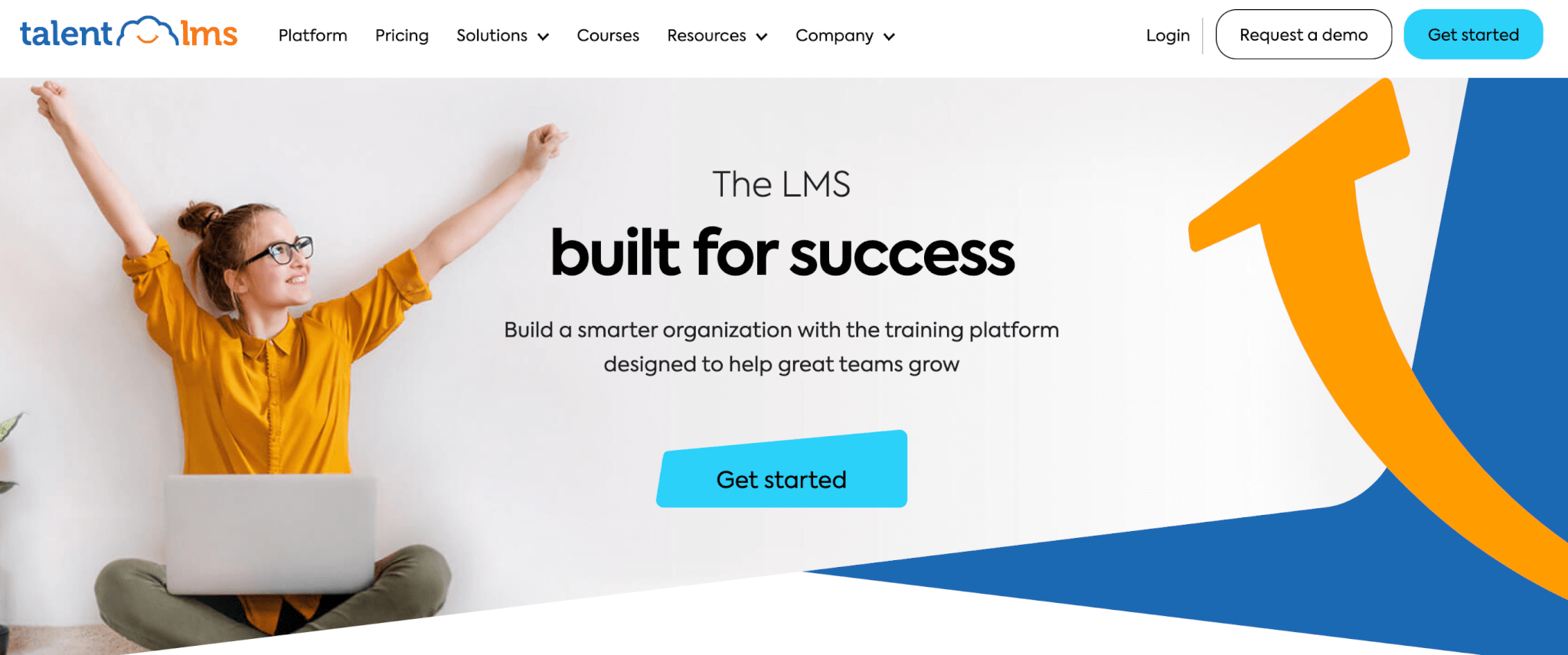





TalentLMS is known for its intuitive, user-friendly interface and its gamification features that include leaderboards, badges, levels, and points. The platform is very easy to set up and supports auto-enrollment, bulk imports, and account syncing from other platforms. It features a drag-and-drop course builder for easier course creation. TalentLMS recently introduced TalentCraft, their AI content creation tool.
The platform allows you to build custom learning paths based on rules and supports customizable sub-accounts/training portals (with limitations per pricing plan), admin task automation, and in-depth reporting with advanced features like scheduling and training infographics.
🤔TalentLMS has limited eCommerce capabilities, so it may not be a good fit for customer education.
Pros & Cons
Pros
- Rich gamification
- Offline learning
- Highly intuitive
- Free plan (up to 5 users)
- White-label mobile app
Cons
- Limited homepage customization
- Limited eCommerce capabilities
- Basic community features
- Limited/problematic integrations
- Limitations on the number of users and training portals
Pricing
TalentLMS offers different plans for active users and registered users.
Standard plans (based on the number of registered users) include:
Active plans (based on the number of active users) include:
5. iSpring Learn
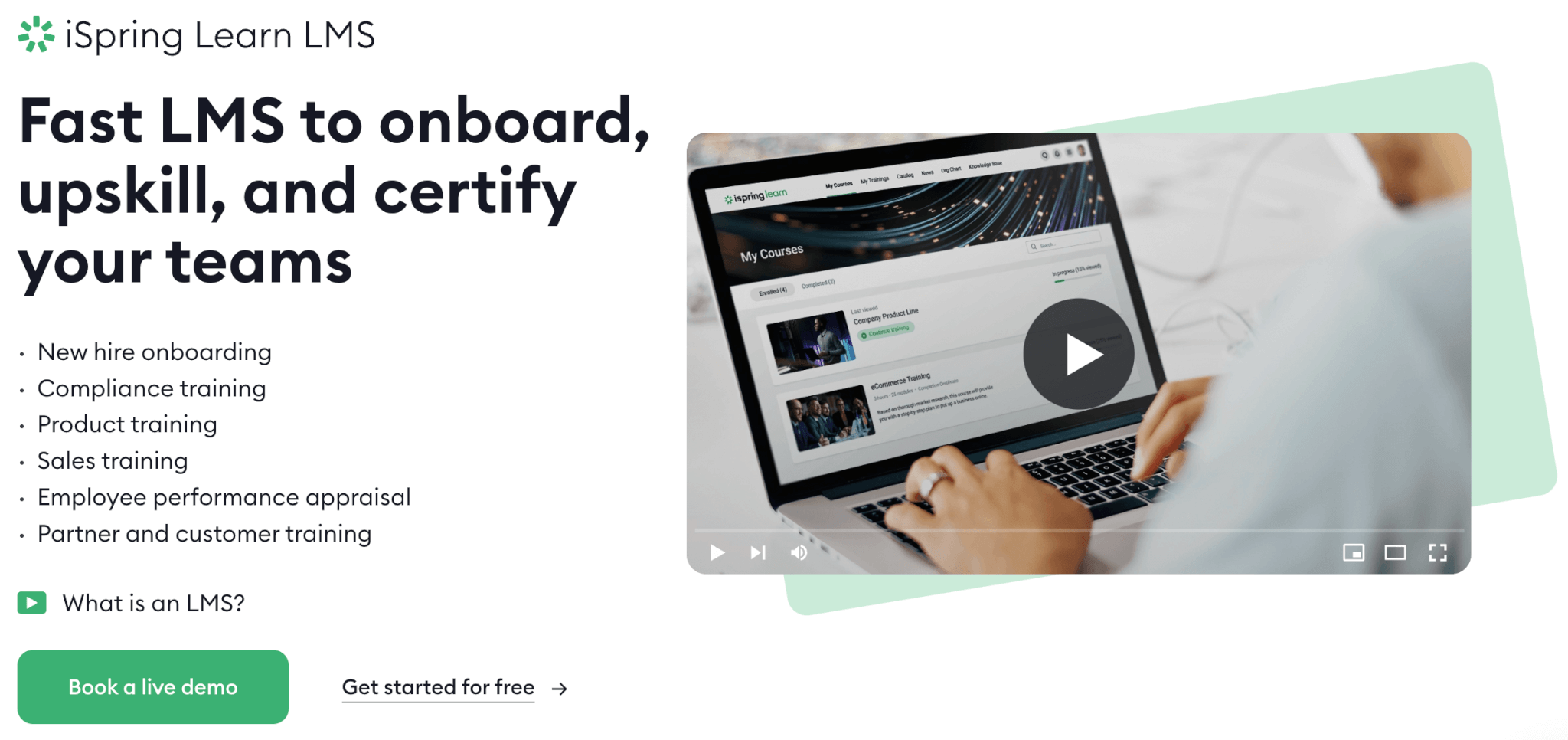





iSpring Learn is another intuitive LMS system to centralize training materials and deliver training for multiple use cases. iSpring promises to improve workflow through automations, multiple admin roles, and user groups while helping you upskill your employees. The platform generates in-depth reports, offers a Supervisor Dashboard, and has a certificate management system.
To boost learner engagement, the platform supports diverse content types, from role plays to assessments, and features game mechanics and social learning like chats and newsfeeds. It also supports AI course creation for faster content development. Another benefit of iSpring Learn is the Events Calendar that allows you to manage all your training events, on-site and online, from one single dashboard.
🤔Several customer reviews mention that the reporting system is complicated.
Pros & Cons
Pros
- Gamification
- 360-degree feedback surveys
- White-label mobile app
- Built-in content authoring tool
- Automated course management
Cons
- Complex reporting tool
- A few limitations in course design
- No eCommerce features
- It’s occasionally slow to load
- Limitations in the admin portal
Pricing
iSpring Learn offers a 30-day free trial. All plans are billed annually and are based on the number of users.
Indicatively, in the START plan:
The BUSINESS plan comes with more functionalities and at a higher price:
6. 360Learning
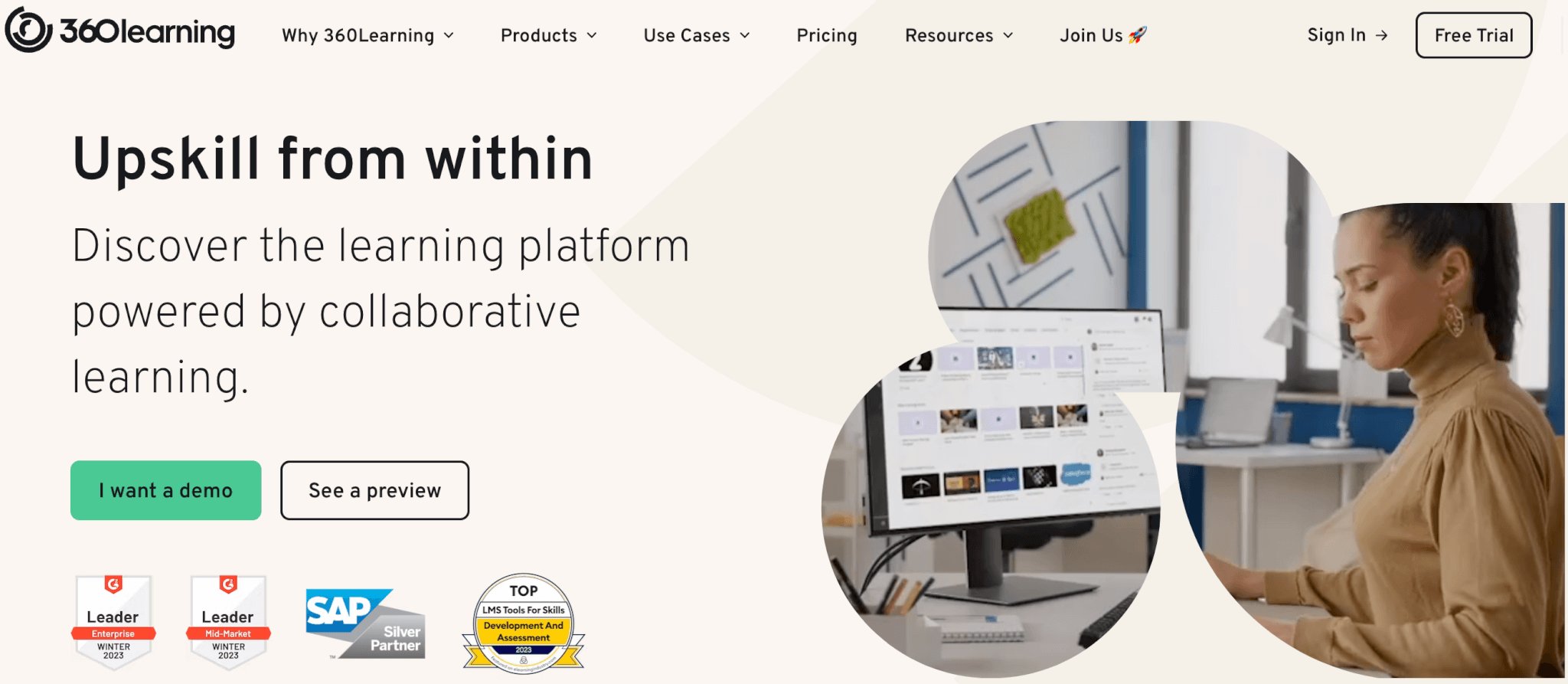





360Learning is an AI-powered LMS platform with a built-in system that enables you to identify skills gaps and build online courses and personalized paths relevant to your employees’ needs. It features a built-in video recorder and has a robust assessment builder with more than 10 question types.
The platform offers advanced options for user management, such as admin roles within user groups, user sync and workflows, self-registration with a magic link, and more. The platform’s AI assists with content creation and brings personalized course suggestions for users. 360Learning features several useful integrations, such as Zoom, HR tools, eCommerce, and Salesforce.
🤔Although 360Learning is quite intuitive once you get a hold of it, customer reviews mention that navigating the platform and setting up a course can be confusing at first.
Pros & Cons
Pros
- Advanced AI
- Robust assessments
- Advanced user management
- Skills mapping
- White-label mobile app
Cons
- Steep learning curve
- Complex reporting
- Basic onboarding material
- Basic built-in content authoring
- Limited design customization
Pricing
360Learning offers a 30-day free trial and the following pricing plans:
7. LearnUpon
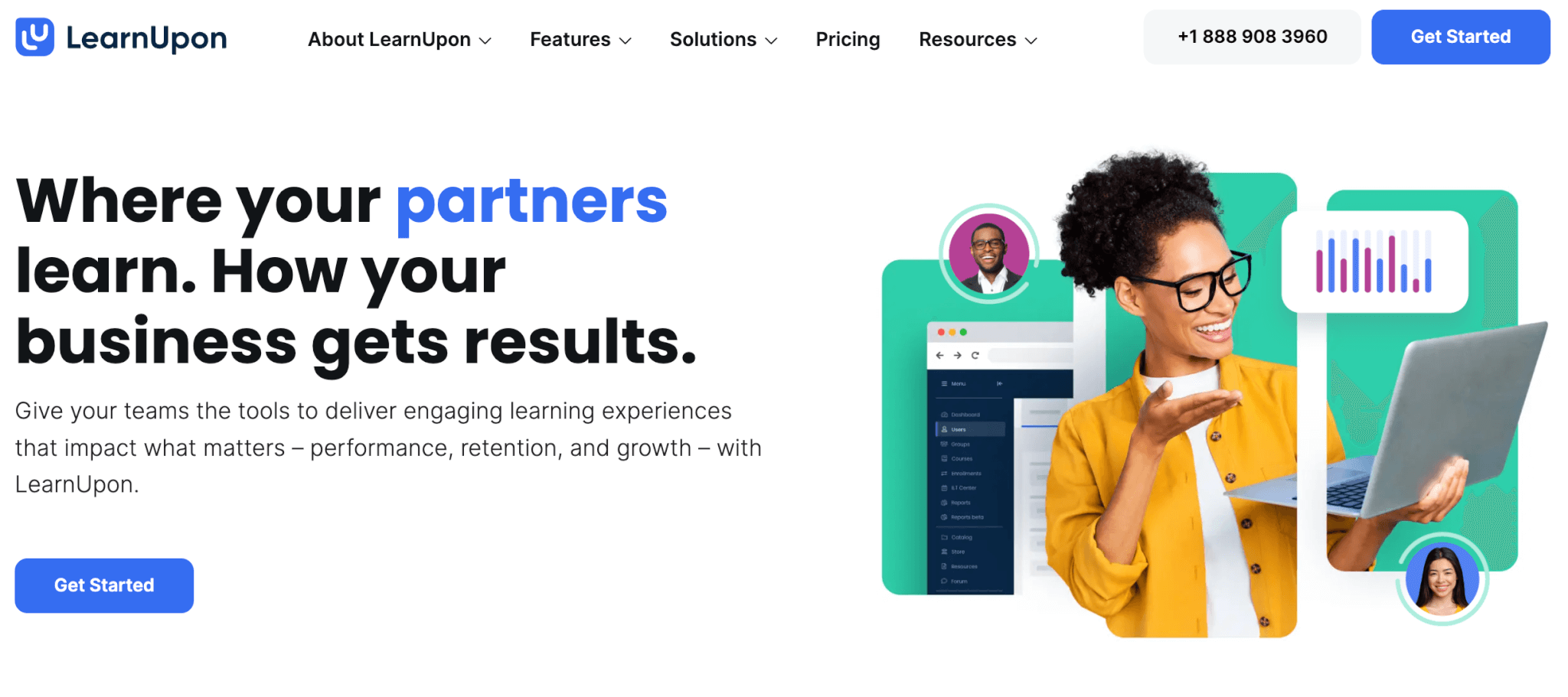





LearnUpon is an AI-powered LMS software that allows you to create engaging training courses. The platform’s AI is one of the most advanced, as it assists with course creation and content recommendations. You can build separate branded training environments and easily share content and courses among each other.
LearnUpon also features gamification elements, course certificates, and discussion boards to boost learner engagement. The platform automates user creation and enrollment and allows for self-registration. It also allows for user segmentation for efficient user management. Advanced reporting features, such as display on other systems and scheduling, are also available. That said, the reports you can pull out are rather basic.
🤔Several customer reviews mention that the Learning Paths are rather inflexible and don’t allow learners to navigate freely through the courses.
Pros & Cons
Pros
- Advanced AI
- Variety of integrations
- Excellent customer support
- Highly intuitive
- Continuous updates
Cons
- Limited user roles
- Technical glitches
- Limited number of reports
- No support for HTML5
- Learning Paths are not flexible
Pricing
LearnUpon doesn’t offer pricing information on their website, but they do mention the pricing plans available.
8. Tovuti
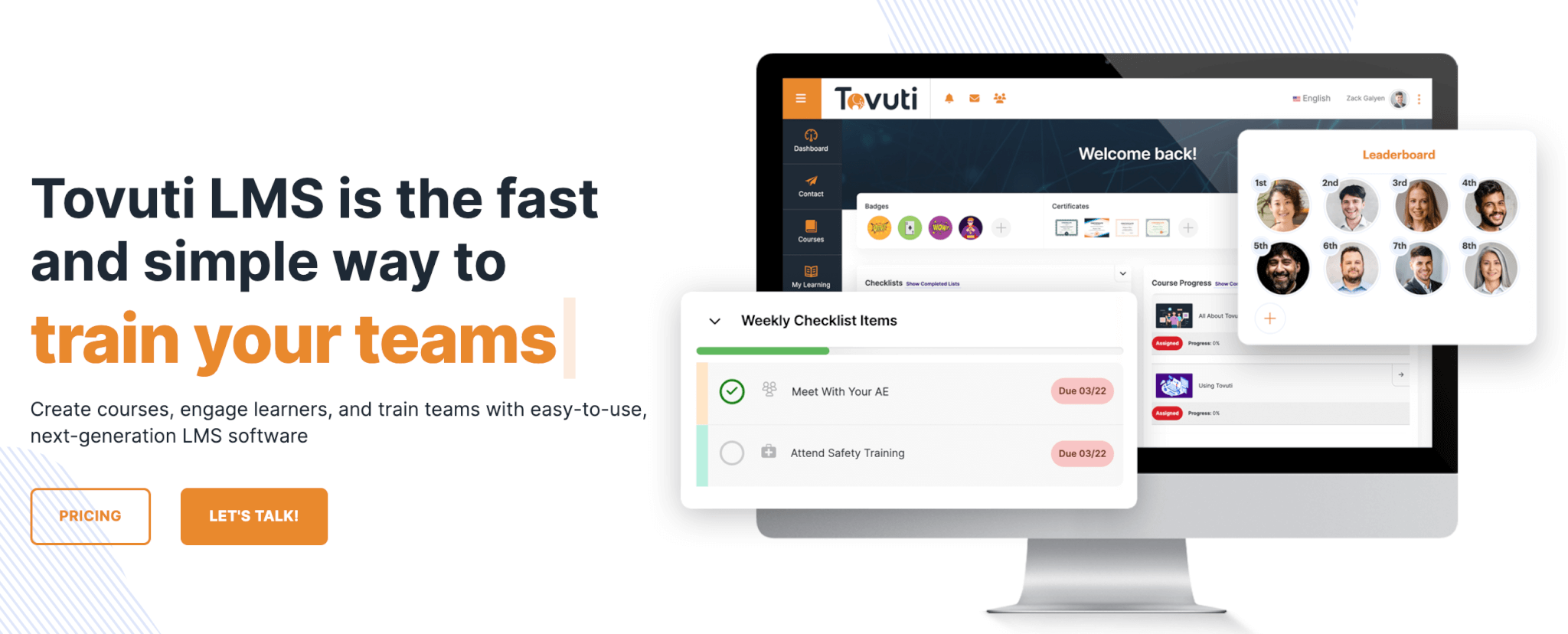





Tovuti LMS offers a training solution for small-medium businesses with features like content management tools, built-in video conferencing tools for your live sessions, and a native mobile app. The platform is also fully white-labeled and highly scalable, supporting 2,000+ API integrations, custom user roles, separate branded portals, and an unlimited number of courses.
TovutiLMS supports AI course creation and allows you to build custom learning paths depending on your specific requirements. The platform also has deep reporting, is SCORM compliant, and has eCommerce tools.
🤔Customer reviews repeatedly mention that Tovuti is a bit pricier than similar LMS solutions and that customer support is unresponsive.
Pros & Cons
Pros
- AI assistant
- Social learning community
- Learner dashboard
- White-labeled
- eCommerce tools
Cons
- Expensive
- Slow customer support
- Limited customization in course creation
- Steep learning curve
- Inconsistent UX on mobile
Pricing
Tovuti LMS has two main plans, Pro and Lite. Lite is the more affordable solution, although it comes with fewer features than Pro. The starting prices are:
9. CYPHER Learning
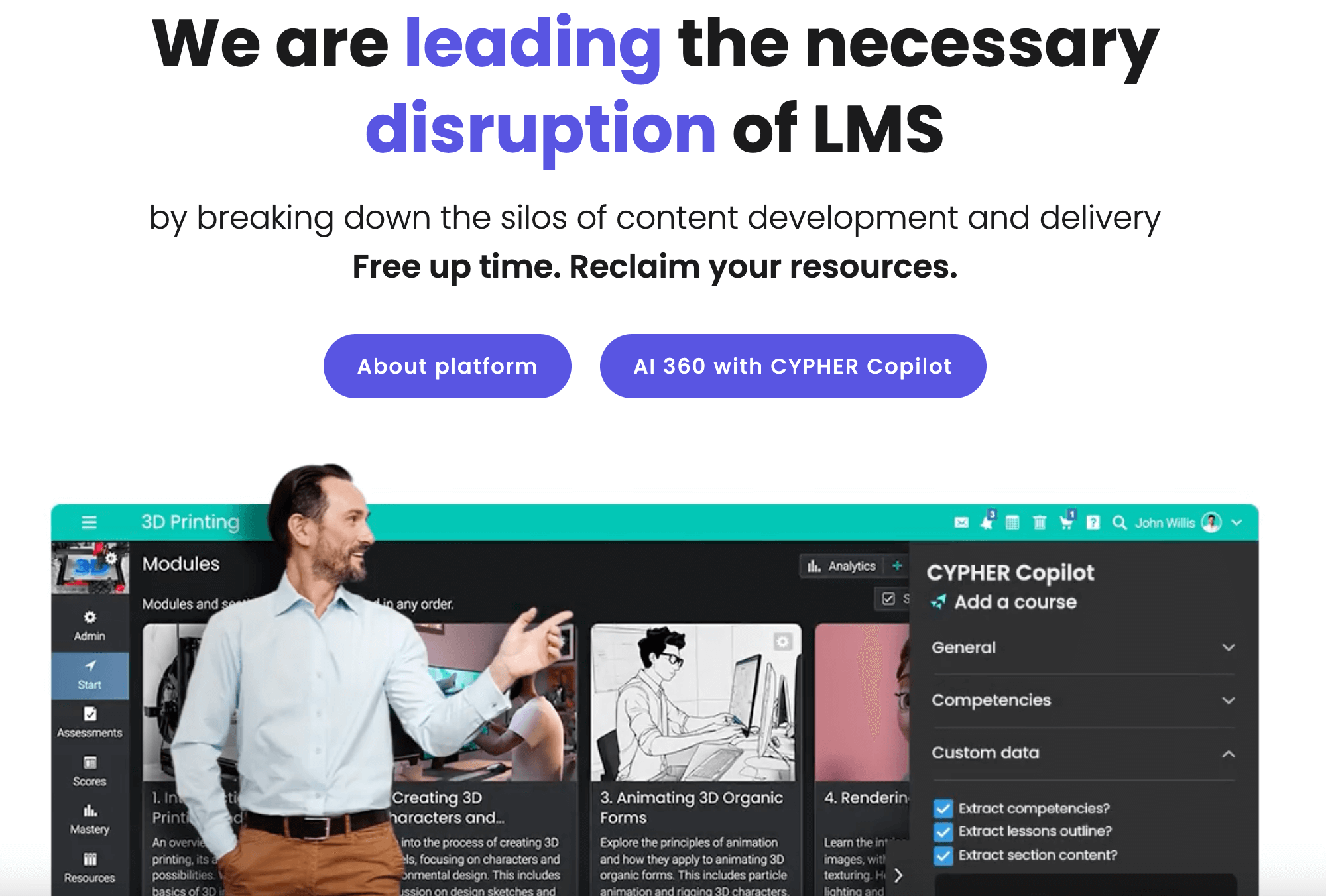





CYPHER Learning is an intuitive Learning Management System that puts a different spin on online learning, emphasizing human connection. It supports multiple content formats and helps you build social and gamified learning experiences with games, leaderboards, chat, and discussion forums. Leveraging the built-in assessments available, you can build competency-based and custom-tailored training. CYPHER Learning also has an AI-powered content creation tool with embedded gamification offered at an extra cost.
The platform is highly scalable, supporting 50 languages, multiple built-in integrations, and API. It offers 25 automated actions to replace manual work. Plus, it offers the MATRIX LMS mobile apps for iOS and Android for learning on the go and is SCORM compliant.
🤔CYPHER Learning might be an expensive LMS for a small business.
Pros & Cons
Pros
- Rich assessment tools
- AI content creation
- Highly scalable
- Ease of use
Cons
- Learning curve due to many features
- Limited reporting
- Customer reviews mention it’s expensive
- Needs more support resources
- Customer support only via email
Pricing
Pricing is available upon request.
10. SkyPrep
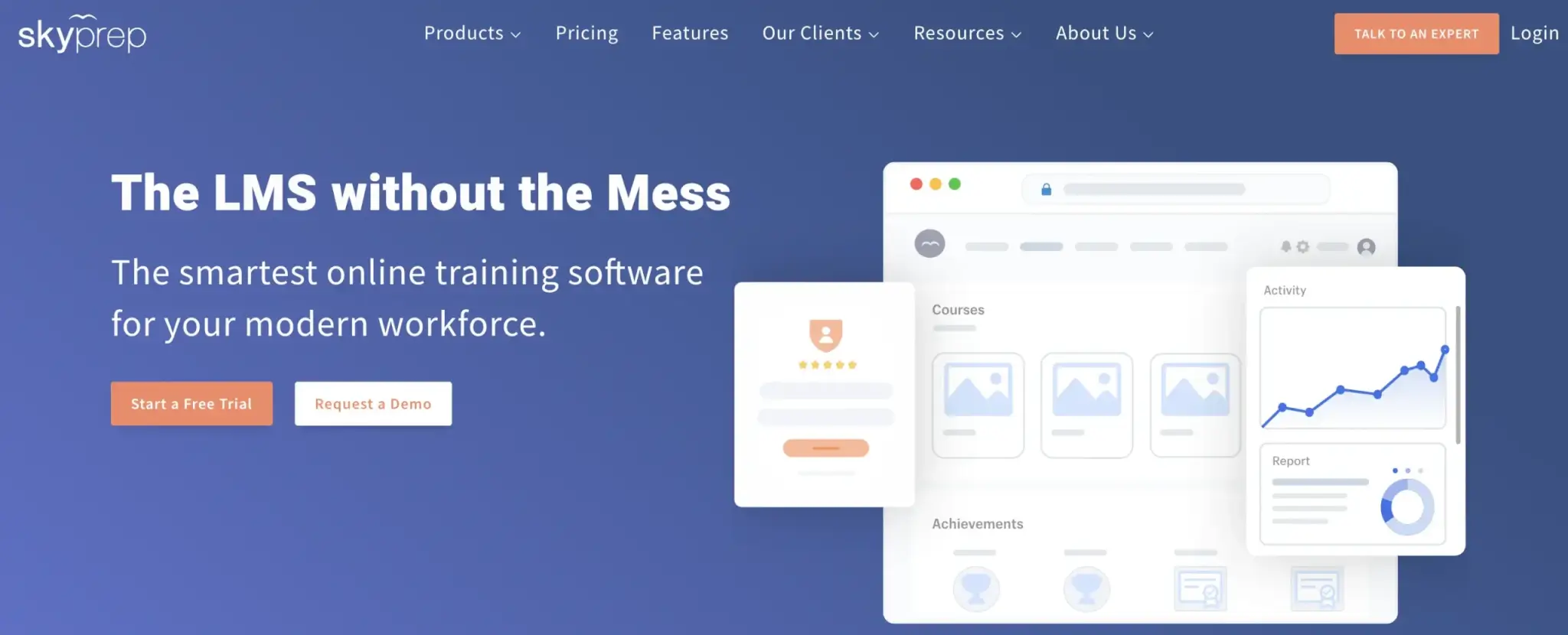





SkyPrep is an intuitive platform with rich LMS features that supports multiple types of content and allows for content authoring in the platform. It enables you to create course checklists to build learning paths and has advanced gamification, custom course certificates, and a built-in blog to enhance engagement.
The platform has a dashboard with key training metrics and built-in, customizable reports, although the reports could be more in-depth. On the admin side, you can set automated notifications and auto-enrollment, or schedule reports. The platform is scalable and allows you to create separate learning environments that you can customize and easily share content among them.
🤔SkyPrep doesn’t have an AI assistant for content creation, which is a disadvantage if you plan to develop content on your own.
Pros & Cons
Pros
- Intuitive
- eCommerce tools
- Gamified
- Several automations available
- SCORM compliant
Cons
- No AI
- No community feature
- Lacks in-depth reporting
- Not fully white-labeled
- Customer support is not available 24/7
Pricing
SKyPrep offers a 14-day free trial. Pricing is available upon request.
Which is the Best LMS for Your Small Business?
Small businesses have the same training needs as large ones – onboarding, upskilling, and compliance are issues that concern all companies regardless of size. But for you, it’s even more important to have a user-friendly LMS with excellent support; one that will turn into your training partner!
Take advantage of our 30-day free trial now, and start building BIG training courses for your small business with the most comprehensive LMS solution in the market! Discover how LearnWorlds, with its rich learning features, limitless expansion and customization capabilities, and outstanding customer support, is the only tool you’ll ever need to train your people.
Further reading
- 10 eLearning Trends
- What is an LMS (Learning Management System)?
- SCORM 101: The Definitive Guide to Choose a SCORM Compliant LMS
- 10 Best WordPress LMS Plugins Comparison
- The 19 Best Learning Management Systems
- The Benefits of Mobile Learning: Unveiling Its Power and How It Works
- The Essential Guide on How to Create Cohort-Based Courses

Androniki Koumadoraki
Androniki is a Content Writer at LearnWorlds sharing Instructional Design and marketing tips. With solid experience in B2B writing and technical translation, she is passionate about learning and spreading knowledge. She is also an aspiring yogi, a book nerd, and a talented transponster.

